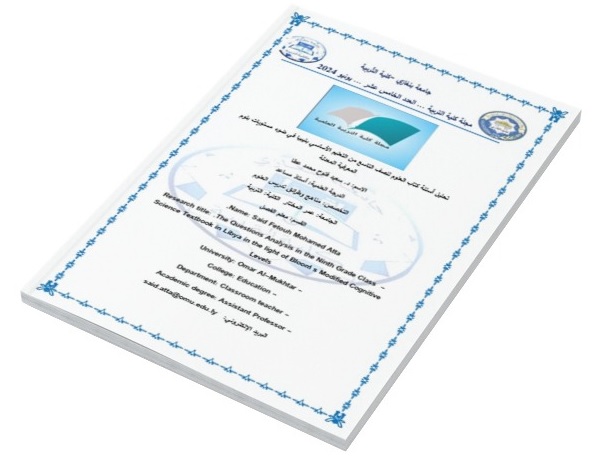The Questions Analysis in the Ninth Grade Class Science Textbook in Libya in the light of Bloom҆ s Modified Cognitive Levels
DOI:
https://doi.org/10.37376/fesj.vi15.5570Keywords:
question analysis, ninth grade, science book of basic education in Libya, modified Bloom’s levelsAbstract
The current study aimed to identify the extent to which the questions of the science book for the ninth grade of basic education in Libya take into account Bloom҆s Modified Cognitive Levels. The researcher used the descriptive approach through the content analysis method. The study included all the questions of the student’s book for the ninth grade of education. The basic study in Libya, in its two parts (first and second), which includes “review questions” and “thinking corner questions”; The results of the study reached the following: The first level (remembering) and the second level (understanding) were taken into account in the book’s questions in a general way, with a percentage of (69.11%), while the rest of the four levels, whose questions require the student to have higher mental abilities, were taken into account with the rest of the percentage. It does not exceed (30.90%), but the analysis level alone represented (18.70%) of this percentage, while the percentages of the application, evaluation, and creativity levels were small percentages, namely (5.69%), (1.63%), and (4.88%), respectively. The high level of analysis is the most important characteristic of the results of this study.
In more detail, the first level (remembering) and the second level (understanding) were taken into account in the “review questions” at a rate of (81.18%), while the remaining four levels, whose questions require the student to have higher mental abilities, were taken into account at a rate not exceeding (18.82%). It was distributed between the application and analysis levels, with percentages of (7.06%) and (11.76%), respectively, while the “evaluation” and “creativity” levels did not receive any percentage. The first level (remembering) and the second level (understanding) were taken into account in the “Thinking Corner Questions” with a percentage of (42.10%), while the rest of the four levels, whose questions require the student to have higher mental abilities, were taken into account with the rest of the percentage, which amounted to (57.89%). It is a distinct percentage that reflects the name of these questions, which are called “Thinking Corner” questions. This percentage was distributed at the levels of application, analysis, evaluation, and creativity in the following percentages (2.63%), (34.21%), (5.26%), and (15.79%), respectively. Accordingly, the study reached a set of recommendations, the most important of which is the need for science curriculum developers and science textbook authors to reconsider the questions of the ninth-grade basic education science textbook in general and the “review questions” in particular, taking into account Bloom’s modified levels of knowledge, especially the last four levels. It was suggested The study conducted similar analytical studies on the extent to which the content of the ninth grade science textbook takes into account the modified Bloom levels, as well as at different educational stages.
Downloads

Downloads
Published
How to Cite
Issue
Section
License
Copyright (c) 2024 Science Journal of Faculty of Education

This work is licensed under a Creative Commons Attribution-NonCommercial-NoDerivatives 4.0 International License.














